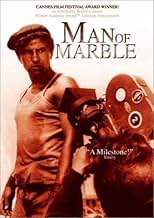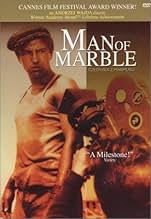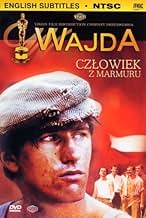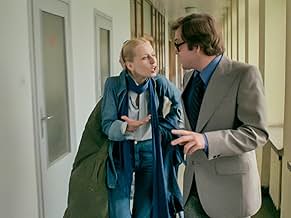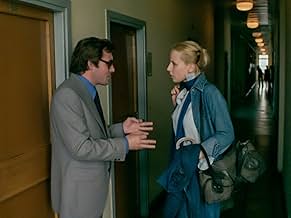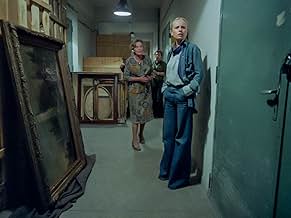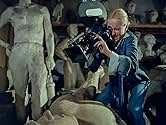NOTE IMDb
7,7/10
5 k
MA NOTE
Un jeune cinéaste polonais cherche à savoir ce qu'il est advenu de Mateusz Birkut, un maçon qui est devenu un héros de la propagande dans les années 1950, mais qui est ensuite tombé en disgr... Tout lireUn jeune cinéaste polonais cherche à savoir ce qu'il est advenu de Mateusz Birkut, un maçon qui est devenu un héros de la propagande dans les années 1950, mais qui est ensuite tombé en disgrâce et a disparu.Un jeune cinéaste polonais cherche à savoir ce qu'il est advenu de Mateusz Birkut, un maçon qui est devenu un héros de la propagande dans les années 1950, mais qui est ensuite tombé en disgrâce et a disparu.
- Réalisation
- Scénario
- Casting principal
- Récompenses
- 4 victoires et 1 nomination au total
Avis à la une
Andrzej Wajda has always impressed me, and his war trilogy are among the best and most essential films in the history of cinema, but "Man of Marble" is an ambitious, interesting idea that isn't realized very well in script or in terms of the finished product.
The most interesting aspect of "Man of Marble" outside of the much-examined similarities to "Citizen Kane" is how subversive it is. I wonder how this was ever released in Poland at the time, and the scenes in the film where I felt Wajda really did succeed as a director is where he contrasts Soviet propaganda with the actual events- very powerful. Wajda fails more than he succeeds with this particular film though, it's a disjointed narrative and it takes tremendous skill to keep the audience interested in both stories. Sure, one may argue that "Man of Marble" isn't intended as entertainment, but even in the context of art-house cinema this film is only engaging in parts, with Agnieszka's attempt to make this film ending up far more interesting than the film she's making.
I can see where Wajda is going with the way he shot this film, but it just doesn't work very well, and the score for this film has to be one of the worst matches I've ever come across. It's ludicrous.
Something of a companion piece by the same writer and director, I found "Man of Iron" far more engaging and impressive.
5/10
The most interesting aspect of "Man of Marble" outside of the much-examined similarities to "Citizen Kane" is how subversive it is. I wonder how this was ever released in Poland at the time, and the scenes in the film where I felt Wajda really did succeed as a director is where he contrasts Soviet propaganda with the actual events- very powerful. Wajda fails more than he succeeds with this particular film though, it's a disjointed narrative and it takes tremendous skill to keep the audience interested in both stories. Sure, one may argue that "Man of Marble" isn't intended as entertainment, but even in the context of art-house cinema this film is only engaging in parts, with Agnieszka's attempt to make this film ending up far more interesting than the film she's making.
I can see where Wajda is going with the way he shot this film, but it just doesn't work very well, and the score for this film has to be one of the worst matches I've ever come across. It's ludicrous.
Something of a companion piece by the same writer and director, I found "Man of Iron" far more engaging and impressive.
5/10
If 165 minutes seems like a long time to watch a film about a Polish bricklayer who becomes a symbol for over-achievement under the Soviet state, well, it probably is, but the film is not as dry as it might sound, and it's worth watching. Wajda adds an extra layer to the story by showing a young woman director (Krystyna Janda) using filmmaking in the 1970's as a means of uncovering the truth about what happened to this guy, and it's interesting when we see that filmmaking two decades earlier had been a means of creating his image. Just as with the communist statues and artwork from the era which show clean-cut, strong, contented workers, it was a director who came up with the idea for the bricklaying challenge in order to extol the virtues of the ideal worker under communism. Despite all this, the bricklayer (Jerzy Radziwilowicz) has an endearing innocence about him. He really wants to do a good job and to set a record, and later fights to try to find his buddy who has been imprisoned. He seems like a symbol of the Polish people of the period, and it's telling this his fate remains unknown and ambiguous for most of the film.
In poking at the so-called Stakhanovite worker, those who outperformed others but then faced resentment and backlash, Wajda deftly shows how it was all based on lies. He also shows a worker falsely imprisoned, the corruption of the state, and the soullessness of the Soviet-era construction projects ("what architecture," one muses), which is pretty impressive stuff to get produced in 1977, but then again, Wajda pushed boundaries throughout his career. I loved seeing the old archival footage of the actual construction of Nowa Huta and the anti-American propaganda, and I also loved the strength of Janda's character. She's a complete badass, striking her defiant poses in bell bottoms and set to 1970's funk/disco music. Wajda's filmmaking itself is a bit workmanlike but she helps bring it to life, and as with several of his other films, this seems essential as a document of Poland over the second half of the 20th century. I probably would have rated it higher in 1977, and even now debated a higher rating.
In poking at the so-called Stakhanovite worker, those who outperformed others but then faced resentment and backlash, Wajda deftly shows how it was all based on lies. He also shows a worker falsely imprisoned, the corruption of the state, and the soullessness of the Soviet-era construction projects ("what architecture," one muses), which is pretty impressive stuff to get produced in 1977, but then again, Wajda pushed boundaries throughout his career. I loved seeing the old archival footage of the actual construction of Nowa Huta and the anti-American propaganda, and I also loved the strength of Janda's character. She's a complete badass, striking her defiant poses in bell bottoms and set to 1970's funk/disco music. Wajda's filmmaking itself is a bit workmanlike but she helps bring it to life, and as with several of his other films, this seems essential as a document of Poland over the second half of the 20th century. I probably would have rated it higher in 1977, and even now debated a higher rating.
Wajda's MAN OF MARBLE is one of the most compelling attacks on government corruption that I have ever seen. It is a "Citizen Kane"-styled story of a female film student who tries to trace the history of Birkut, a long-forgotten "hero" of the Polish Communist government.
She begins by viewing propaganda film that praises Birkut as a devout worker who slaves away at brick-laying for the officials. He has the appearance of a vigilant, Hercules-like strongman who breezes through the labor without breaking a sweat. Then she goes to interview the director, who was hired by the government. He tells her about the reality of making the film, such as how Birkut was given extra food and water (unlike the other bricklayers). Wajda uses these two conflicting scenes to deconstruct the false imagery that propaganda gives its viewers. He shows us how officials manipulate such situations to their own political good.
The student goes on to interview other subjects who describe the brutal reality of Birkut's off-camera existence. In one devastating scene, she meets his wife, who breaks down and tries to avoid being interviewed. As the truth becomes clearer and clearer, the government begins to intercede in the production of the student's film.
Wajda was a film-maker who was not afraid to criticize the harsh Polish government that eventually was defeated by individuals such as Lech Walesa. MAN OF MARBLE is a testament to those who had to live through the oppression of Communism, and also to those who are still living under its iron fist.
She begins by viewing propaganda film that praises Birkut as a devout worker who slaves away at brick-laying for the officials. He has the appearance of a vigilant, Hercules-like strongman who breezes through the labor without breaking a sweat. Then she goes to interview the director, who was hired by the government. He tells her about the reality of making the film, such as how Birkut was given extra food and water (unlike the other bricklayers). Wajda uses these two conflicting scenes to deconstruct the false imagery that propaganda gives its viewers. He shows us how officials manipulate such situations to their own political good.
The student goes on to interview other subjects who describe the brutal reality of Birkut's off-camera existence. In one devastating scene, she meets his wife, who breaks down and tries to avoid being interviewed. As the truth becomes clearer and clearer, the government begins to intercede in the production of the student's film.
Wajda was a film-maker who was not afraid to criticize the harsh Polish government that eventually was defeated by individuals such as Lech Walesa. MAN OF MARBLE is a testament to those who had to live through the oppression of Communism, and also to those who are still living under its iron fist.
I first learned of Andrzej Wajda when he won an honorary Academy Award and made his acceptance speech in his native Polish. In the years since, I've watched some of his movies. I've finally seen his "Czlowiek z marmuru" ("Man of Marble" in English). It focuses on a filmmaker (Krystyna Janda) putting together a production about a man (Jerzy Radziwilowicz) who got held up as the paradigm of a heroic Stakhanovite but whose whereabouts are now unknown. Then of course arises the issue of how much she'll be allowed to focus on this man without angering the authorities.
It's safe to say that this movie presaged the rise of the Solidarity movement in its depiction of the workers. Wajda was already inclined to direct independently of the government's confines, and he became one of the most innovative directors of all, along the lines of Stanley Kubrick and Federico Fellini. In the end, this is one that you have to see. I hope to see more of Wajda's movies.
It's safe to say that this movie presaged the rise of the Solidarity movement in its depiction of the workers. Wajda was already inclined to direct independently of the government's confines, and he became one of the most innovative directors of all, along the lines of Stanley Kubrick and Federico Fellini. In the end, this is one that you have to see. I hope to see more of Wajda's movies.
Ironic, tongue-in-cheek, smart and a tad too long, "Man of Marble" is a good movie that can't help being a little bit too much in love with itself, on top of being unable to know where to stop, thus ending being a little bit repetitive.
Agnieszka, a university student doing her diploma film, decides to investigate in the past of long forgotten hero of the people Birkut. Her search brings her to discover a lot about a man that was put in a pedestal to then be forgotten and erased from the history of the nation.
Wajda does not use a lot of subtlety in this film, but who needs it when the script is smart enough, the direction top notch, with some great shots and a pace that is sometimes close to an action movie, and there is really good acting (in particular our hero, Agnieszka, played with a lot of sass and confidence by Krystyna Janda). The score and the use of locations is also great.
However, the movie clocks at over two hours and a half, and the ideas behind the movie: the use of unknown people by the ones in power as little more than toys, destroying lives and dreams without a second of remorse, the difficulty to fight the system or the way paranoia extends everywhere in some regimes become undone by repetition and by a story that starts to spin on its wheels around the 1 hour and a half mark.
It is totally worth checking though. Just be sure to have enough time (you may want to have some breaks).
Agnieszka, a university student doing her diploma film, decides to investigate in the past of long forgotten hero of the people Birkut. Her search brings her to discover a lot about a man that was put in a pedestal to then be forgotten and erased from the history of the nation.
Wajda does not use a lot of subtlety in this film, but who needs it when the script is smart enough, the direction top notch, with some great shots and a pace that is sometimes close to an action movie, and there is really good acting (in particular our hero, Agnieszka, played with a lot of sass and confidence by Krystyna Janda). The score and the use of locations is also great.
However, the movie clocks at over two hours and a half, and the ideas behind the movie: the use of unknown people by the ones in power as little more than toys, destroying lives and dreams without a second of remorse, the difficulty to fight the system or the way paranoia extends everywhere in some regimes become undone by repetition and by a story that starts to spin on its wheels around the 1 hour and a half mark.
It is totally worth checking though. Just be sure to have enough time (you may want to have some breaks).
Le saviez-vous
- AnecdotesThe award Burski is flaunting at the airport on his return was Wajda's own award, hence Burski is a mock self-portrait.
- ConnexionsEdited into Sauve la vie (qui peut) (1981)
Meilleurs choix
Connectez-vous pour évaluer et suivre la liste de favoris afin de recevoir des recommandations personnalisées
- How long is Man of Marble?Alimenté par Alexa
Détails
- Durée2 heures 45 minutes
- Couleur
- Mixage
- Rapport de forme
- 1.37 : 1
Contribuer à cette page
Suggérer une modification ou ajouter du contenu manquant

Lacune principale
By what name was L'homme de marbre (1977) officially released in India in English?
Répondre

